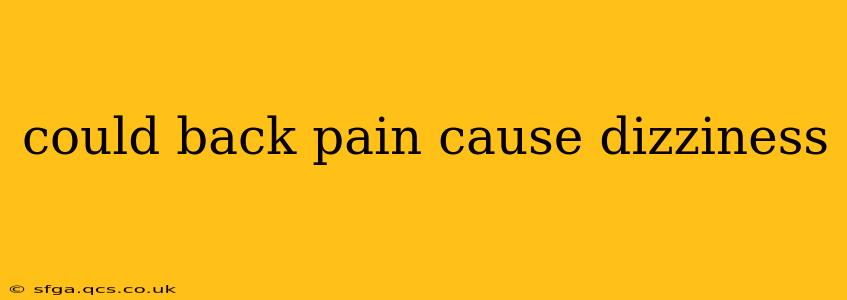Back pain and dizziness are common complaints, and while seemingly unrelated, there's a surprising connection between the two. While back pain itself doesn't directly cause dizziness, underlying conditions affecting your spine and nervous system can trigger both symptoms simultaneously. Understanding this relationship is crucial for accurate diagnosis and effective treatment. This article explores the potential links between back pain and dizziness, addressing common questions and concerns.
What Causes Dizziness with Back Pain?
Dizziness accompanied by back pain isn't a disease in itself, but rather a symptom cluster that points towards various potential causes. These causes often involve the intricate network of nerves connecting your back to your brain and inner ear, which governs balance. Some of the most frequent culprits include:
-
Cervicogenic Dizziness: This is a significant contributor, referring to dizziness originating from the neck. Problems in the upper spine, such as whiplash, arthritis, or disc herniation, can irritate nerves responsible for balance, leading to dizziness along with neck and upper back pain.
-
Vertebrobasilar Insufficiency (VBI): This condition involves reduced blood flow to the brainstem and cerebellum, areas vital for balance and coordination. Spinal issues, particularly in the neck, can compromise blood vessels, potentially resulting in dizziness and back pain. This is a serious condition and requires immediate medical attention.
-
Orthostatic Hypotension: A sudden drop in blood pressure upon standing can cause dizziness and lightheadedness. While not directly linked to back pain, certain spinal conditions might indirectly affect blood pressure regulation, contributing to orthostatic hypotension.
-
Inner Ear Problems: While not always directly connected to back pain, issues in the inner ear (vestibular system) responsible for balance can manifest as dizziness. In some cases, severe neck pain might strain the inner ear indirectly, although this is less common.
-
Dehydration: While seemingly unrelated, severe dehydration can trigger both dizziness and back pain due to muscle cramps and reduced blood volume.
Can a Herniated Disc Cause Dizziness?
Yes, a herniated disc, especially in the neck (cervical spine), can indeed cause dizziness. A herniated disc can compress nerves, leading to referred pain and, in some cases, affecting the nerves that control balance and spatial orientation. This is a classic example of cervicogenic dizziness.
Does Spinal Stenosis Cause Dizziness?
Spinal stenosis, a narrowing of the spinal canal, can also cause dizziness, particularly in the cervical spine. Similar to herniated discs, the narrowing can compress spinal nerves, resulting in dizziness, alongside neck, shoulder, and arm pain.
Can Back Pain Cause Vertigo?
While back pain itself doesn't cause vertigo (the sensation of spinning or whirling), the underlying conditions mentioned above, such as VBI or cervicogenic dizziness, can cause vertigo-like symptoms. It's crucial to differentiate between true vertigo from inner ear issues and dizziness stemming from spinal problems.
What to Do if You Experience Back Pain and Dizziness
If you experience back pain accompanied by dizziness, seek medical attention immediately. The combination of these symptoms warrants a thorough evaluation to identify the underlying cause. Delaying diagnosis can potentially lead to more significant problems. Your doctor will likely perform a physical examination, neurological tests, and possibly imaging studies (X-rays, MRI) to determine the source of your symptoms and recommend the appropriate treatment plan.
Conclusion
The connection between back pain and dizziness is often complex and necessitates professional medical evaluation. While not always directly linked, underlying spinal problems can significantly impact your balance and coordination, leading to dizziness alongside back discomfort. Prompt medical attention ensures accurate diagnosis and appropriate management to alleviate your symptoms and prevent further complications. Remember, this information is for educational purposes and does not replace professional medical advice. Always consult with a healthcare professional for any health concerns.
